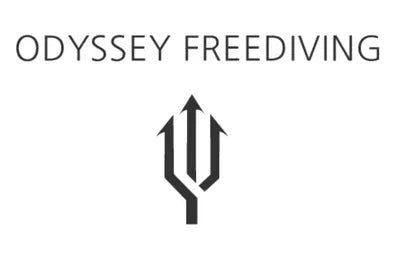The Gear You Need to Succeed
Freediving equipment by design is created to meet the unique demands and specifications required for pursuing depth. While similar to equipment is used in other watersports such as snorkeling and scuba diving, distinct differences make freediving gear more suited to your needs. The following list should be used as a guide when selecting freedive gear.
Note: The philosophy of Odyssey Freediving is you don't need the latest and greatest equipment to succeed. Higher end materials and specific items become more optimal as you evolve as a freediver but are not completely necessary, especially when starting out.
It is important to remember that YOU are the most important piece of this equation. Your skill, knowledge, and training rank supreme for success. With that being said, having the right tools for the job makes things easier and the following items will best prepare you for your path towards becoming a strong freediver.
1. Low Volume Mask
- Your mask is your most critical piece of gear. It must fit properly and be comfortable on your face. Mask issues are a huge distraction while freediving and should be avoided by training with your mask in the pool until you are 100% comfortable with it.
- Low volume is essential. This ensures the air in your lungs stays there and doesn't have to be pushed into your mask constantly to pressurize it. Larger volume masks also increase the likelihood of eye barotrauma via mask squeeze.
- Rubber straps are best for keeping your mask secure and neoprene mask covers should be avoided.
2. Snorkel
- Simplicity is best. A simple J-tube snorkel with no valves or external features is optimal. It also reduces drag underwater.
- I've found semi rigid snorkels to be just right. Hard plastic snorkels can become brittle and crack, too soft and they flop around too much. A semi rigid version like the Odyssey Stealth Snorkel works extremely well in all environments.
- Use a figure 8 snorkel keeper to ensure your snorkel stays on your mask and can still be adjusted easily.
3. Long Blade Fins
- Long blade fins are also essential for deep freediving. A larger surface area allows you to create maximum thrust with efficiency allowing you to penetrate deeper with minimal effort.
- Closed heel foot pockets ensure no energy loss when kicking, and offer a superior fit.
- Shorter snorkel and scuba fins work, but are often too heavy and don't create as much thrust per kick. Long blade freediver fins help you cover more distance using less time, oxygen and energy.
4. Wetsuit
- Your wetsuit becomes your second skin in the water and is critical for keeping you comfortable. An open cell wetsuit is ideal.
- Open cell wetsuits
- Trust your instincts and prioritize safety above all else.
5. Weight Belt
- Rubber or silicone style belt, no nylon
- Marseilles buckle is best, with clasp buckle being acceptable
- Weights should be evenly distributed throughout the weight belt to ensure balanced ballast. Set up as right hand release.
6. Weights
- Smaller denominations of lead weights work best, and are easy to adjust if necessary (2-4 lbs each).
- 12-18 lbs for 7 mm wetsuit, 8-14 lbs for 5 mm wetsuit, 4-10 lbs for 3 mm wetsuit, 0-6 lbs for 1 mm wetsuit.
- Weights can be slotted or slide through.
7. Socks and Gloves
- Basic exposure protection to keep your hands and feet warm. Gloves range from extremely thin to 5+ mm thick. I prefer 3 mm as it is versatile in almost all conditions.
- When spearfishing and/or lobstering a heavier duty glove is recommended. Usually these gloves are reinforced with thick rubber or a material like kevlar.
- Note that dive socks are different from scuba booties. Scuba boots usually have a hard, thick sole which is goof for carrying heavy scuba loads but not ideal for fitting in the closed foot pocket of a freedive fin.
Accessory Gear
- Wetsuit Lube- Essential for putting on your suit.
- Knife/Line Cutter- Excellent tool to carry as a precaution.
- Mask Defog- It helps to be able to see. Mask defogs keeps your lenses clear.
By following these tips for outdoor exploration and resilience, you'll not only enhance your own adventures but also contribute to a greater sense of stewardship and appreciation for the natural world. At Odyssey Freediving, we're committed to empowering outdoor enthusiasts with the knowledge and resources they need to thrive in any environment.
For more tips, gear recommendations, and inspiring stories, visit our website at Odyssey Freediving.


